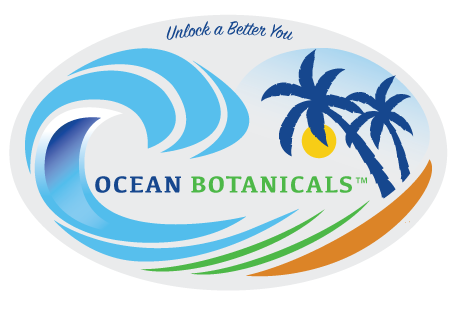
As a registered nurse with 30 years of experience in cardiology, I’ve seen a lot of trends come and go. But nothing has quite captured the modern wellness world like sea moss.
What surprises me most is that many users feel amazing while others report negative side effects.
Having grown up on sea moss and studied the science behind it, I can tell you why.
Why Sea Moss Works for Some But Not Others
Sea moss is full of minerals like iodine, calcium, and fiber—so yes, it can offer real benefits like improved energy, digestion, and hormone balance. But not everyone has the same experience. Here’s why:
It Works Best When:
-
You’re deficient in key nutrients like iodine, magnesium (50% of Americans), iron (40% of adolescents and young women), Calcium (42% of Americans).
-
You choose a high-quality, wildcrafted product (like the ones from Ocean Botanicals).
-
Your gut and hormones are balanced enough to absorb and respond to it properly.
It Might Not Work (or Cause Side Effects) If:
-
You already get enough iodine—which can lead to thyroid disruption.
-
You’re using over-processed or low-quality sea moss with fillers or contaminants.
-
You have underlying conditions like PMDD, gut sensitivities, or are on medications that interact with it.
Sea moss isn’t a miracle fix—and that’s okay.
When used intentionally, it can be a powerful natural addition to your wellness routine. Just make sure it’s the right fit for your body.
Explore our trusted, wildcrafted sea moss here or learn more on the Ocean Botanicals blog.
3 Reasons Why Some People Feel Great on Sea Moss
I’ve come to appreciate both the power and the limits of natural remedies.
I’ve seen patients and friends experience noticeable improvements from adding sea moss to their routine—but I’ve also seen a select few who didn’t feel much of anything, or even felt worse.
Let’s talk about why some people really DO feel great after taking sea moss.
1. They Had a Nutrient Deficiency—Without Realizing It
Many people suddenly feel more energized and clear-headed when they start taking sea moss.
Often, it’s because they were running low on certain minerals—without even realizing it.
And here’s the surprising part: many people are unknowingly running low on these minerals in their everyday diet.
According to national health surveys:
-
Nearly 50% of Americans get less than the recommended daily magnesium intake, which can contribute to fatigue, anxiety, and muscle cramps.
-
Around 30% of women under 50 are deficient in iron, which can lead to low energy, brain fog, and irregular periods.
-
Calcium deficiency affects an estimated 42% of the U.S. population, particularly in young adults and postmenopausal women.
Sea moss naturally contains 92 essential nutrients like iodine, magnesium, potassium, zinc, and iron—all of which play a critical role in how your body functions.
These nutrients help support everything from thyroid function and hormone regulation to digestive health, mood stability, and energy production.
If you’ve been feeling unusually fatigued, foggy, or irregular, it might be worth looking at your diet to see if you’re consistently getting enough of these essential nutrients.
If not, sea moss can be one natural way to help fill the gap.
Related: 5 Benefits of Sea Moss for an Active Lifestyle
2. They Chose a High-Quality, Well-Sourced Product
The quality of your sea moss matters. Avoid pool-grown, heavily processed, or even white-labeled versions with unknown ingredients.
These imitations are lower in nutrients and can carry unwanted contaminants.
At Ocean Botanicals, our sea moss is wildcrafted from clean waters along the coasts of St. Lucia.
We never use fillers, synthetic ingredients, or overly processed forms.
3. Their Gut and Hormones Were Already in a Good Place
Sea moss has prebiotic properties, which means it can help feed the good bacteria in your gut—but only if your gut is in decent shape to begin with.
People with balanced digestion and hormone levels often notice noticeable improvements in mood, energy, and even appetite when adding sea moss to their routine.
If your gut microbiome is out of whack, your body might not process sea moss as well—or at all.
Make sure you’re supporting your gut with whole, fiber-rich foods and staying hydrated. And if your hormones tend to be sensitive, be extra mindful about introducing new supplements.
Sea moss can complement a healthy routine, but it’s not a fix-all.
Related: Easy ways to add sea moss into your diet
3 Reasons Why Sea Moss Doesn’t Work for Some People
As much as I love sea moss and have seen its benefits firsthand—I’ve also seen how it doesn’t work for everyone. And that’s okay. Natural doesn’t mean perfect.
Here are some of the most common reasons sea moss may not work for some people.
1. They’re Already Getting Enough (or Too Much) Iodine
Sea moss is naturally rich in iodine, a nutrient your body needs in small amounts to support healthy thyroid function.
The thyroid plays a big role in regulating your energy, metabolism, and even your menstrual cycle. So for someone who’s low in iodine, a little boost from sea moss can feel like a godsend.
But for others—especially those who already get iodine from iodized salt, seafood, or multivitamins—too much iodine can overwhelm the thyroid.
If you already eat iodine-rich foods or take supplements with iodine, go slow with sea moss.
It’s okay to start small with 1/2 teaspoon and monitor how you feel over time. And if you have known thyroid concerns, it’s a good idea to speak with a healthcare provider before adding anything new.
2. They’re Using a Poor-Quality or Overprocessed Product
This is one I see all the time. Some sea moss products are pool-grown, heavily processed, or sold under generic "white label" brands.
These products may be stripped of nutrients, contain unwanted fillers, or even be contaminated with heavy metals like mercury or lead if not properly tested.
Read labels carefully! Avoid pills or powders with unfamiliar additives. Look for companies that share where their sea moss is sourced and their production process.
3. They Have Underlying Conditions or Medication Conflicts
Sometimes sea moss just doesn’t agree with someone’s body. That often has more to do with underlying health conditions or medications than the sea moss itself.
People who struggle with things like PMDD, hormone imbalances, gut sensitivities, or autoimmune conditions may be more reactive to small changes in their diet.
Sea moss might intensify symptoms like:
-
Cramping or bloating
-
Mood swings or emotional instability
-
Digestive upset or loose stools
It can also potentially interact with certain medications, like thyroid medications, blood thinners, or immune system drugs. This doesn’t mean sea moss is dangerous—but it does mean that you need to approach it mindfully, especially if you’re managing a health condition.
Final Thoughts
Sea moss has been part of my life since childhood, and I’ve seen it help people feel more energized, nourished, and balanced—but only when it’s the right match for their body and lifestyle.
If you try it and feel better? Wonderful.
If you try it and it doesn’t sit right? That’s okay too.
Wellness isn’t one-size-fits-all. It’s about learning what works for you, and making informed, thoughtful choices along the way.
Natural doesn’t mean risk-free, so start slow, listen to your body, and choose quality you can trust.
Ready to Try Sea Moss the Right Way?
If you’re curious about adding sea moss to your routine, start with high-quality sea moss you can trust.
At Ocean Botanicals, we offer wildcrafted, raw sea moss sourced from clean Caribbean waters—just like the kind I grew up with.
Take the first step toward nourishing your body with something simple, natural, and time-tested.
